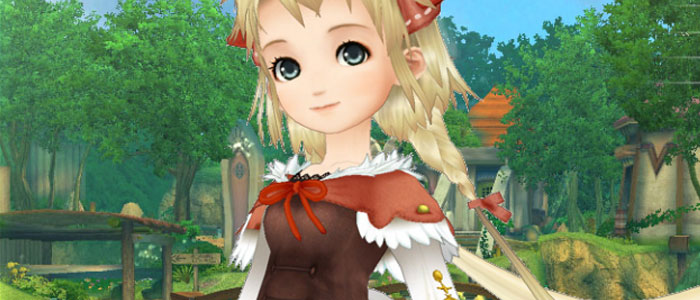Completely prepared for a game that had a little too much J in its RPG, I found myself over the moon with how balanced a title Tri-Crescendo Studios delivered. A few unfortunate quirks aside, Eternal Sonata is a wholly absorbing and successful game. Ported from the previously released 360 game, the PS3 version delivers the same experience with additional material like new cutscenes, music, characters and dungeons.
The story goes that the late, great Frederic Francois Chopin is deathbed ridden and has dreamed up a fantastic world in which to pass his final hours. As far as dying wishes go, I might have omitted some of the enemy opposition but Chopin, apparently, would have an adventure for himself. With a storybook cast of characters Chopin’s first fictional dream companion is Polka, a young lady with the sad fate of being short-lived and therefore able to use magic – which makes other dream people avoid her like the plague.
Joined by Algretto, Beat and Viola as well as two previously unplayables Prince Crescendo and Princess Serenade, the assembly battles the evil Count Waltz who passes his time turning everyone in Forte into slaves with his untaxed and very literal opiate of the masses: mineral powder. The narrative can be a tad overworked at times with a lengthy opening and numbing cutscenes, and this ineffectively countered by livelier gameplay.
Not entirely epic in its scope, Chopin’s adventure is a quietly moving one, and I appreciated the “small” story in a big dream. The heavy handed politics and pace dragged things down, if only because the ethereal dreamscape is so inviting. The story is well-intentioned, it’s just wrong to rip us out of that with musings on taxation and government drug abuse. This is where the bulk of Chopin’s work is used, and I admit I am disappointed they couldn’t use it more within gameplay.
That I found the game lacking in Chopin is not to diminish Motoi Sakuraba’s score, it just demotes the famed composer to something of an inspirational afterthought. The music is, as one would hope, very well done, and for gamers that happen to be fans of the artist it is still a sufficient homage replete with biographical tidbits. Most of the voice talent is very pleasant, if saccharine, with the sad exception of narration and some sections of dialog void of even ambient noise – which sets a very uneasy tone.
Exploration exists, though it is guided and linear with separate paths and rooms on your way to a clear destination. Ultimately, it is Eternal Sonata’s brisk gameplay that quickens the pace of the title. Battles are (with few exceptions) not random encounters, but enemies will pursue you if you get too close. As expected of a JRPG the battles transport you to an outdoor battle arena for some turn-based action. A tactical meter indicates how much more a character can move or attack and Party Levels affect how this meter works (like shifting from unlimited time to a countdown beginning from your first step) as well as battle difficulties.
In addition to basic attacks party members can use items and perform special attacks. The special attacks available are determined by whether the character is standing in sunlight or shade, adding a dynamic component to the action -while you may have positioned yourself strategically to use one of the other an enemy may cast a spell reversing your light-dark situation. These elements, combined with a real-time blocking mechanic (no easy feat), make Eternal Sonata’s gameplay a fantastic combination of real-time and turn-based strategy.
On the downside, enemy AI can be pretty inconsistent: they may wisely target the party member playing doctor, but then get turned around on the battlefield. The NPCs, however, are quality fare, and serve as more than just the standard RPG information farms. My beloved RPG side quests are absent, though you can use Beat’s photographic inclinations to capture shots in battle and sell them later – for more gold than you know what to do with, actually.
Worse, though, is that rotating the camera is a no-no, which makes me cry-cry. Game saves are tedious and if you aren’t a fan of some seriously prolonged cut scene drama the pace of the game may bore you to tears. Load times, on the other hand, are quick and the game is a visual feast. The linear progression of the game avoids the trapof JRPGs – namely, confusion – and the successful battle system keeps the game from feeling shallow.
The additions to the PS3 version of Eternal Sonata add some length and substance to an already satisfying game. A tempting and beautiful dream world, the game design is truly captivating. Richly painted environments match the colorfully charming characters, and with exceptional production values it is clear the title is more than just a half-hearted port. Not an entirely perfect package, Eternal Sonata still packs enough fun and visual appeal to be a really solid game.
